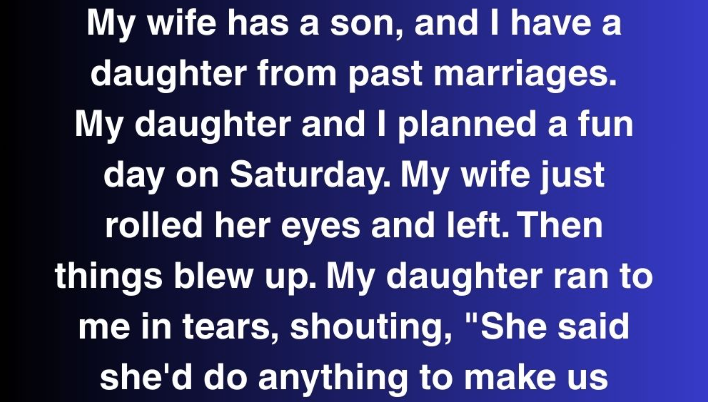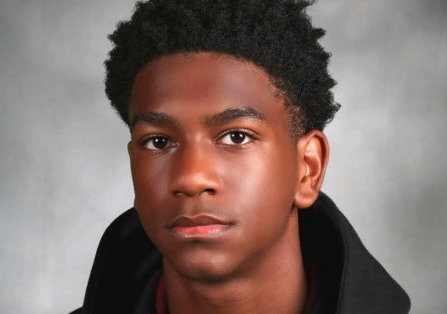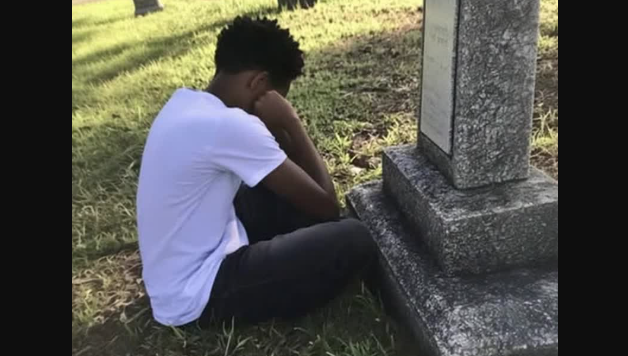My wife has a son, and I have a daughter from previous marriages.
On a bright Saturday morning, my daughter, Yana, and I planned a joyful day together. My wife, Maritza, sighed heavily and walked away. The day took a painful turn when Yana ran to me, tears streaming down her face, crying, “She said she’d do anything to make us leave.”
A chill gripped my heart.
I knelt to her height, gently tucking a strand of hair behind her ear. “Who said that, sweetheart?”
“Maritza,” she choked out. “She told me and then shut the door hard.”
I hid my rising anger, wrapping her in a warm hug and saying, “Go grab your shoes, we’re still going out.” Inside, though, my emotions churned.
Three years ago, when I met Maritza, I was a widower. Yana, then six, was a quiet soul, always sketching or weaving yarn into our cat’s tail. Maritza had a ten-year-old son, Lucas, and seemed to manage co-parenting well after her divorce.
At first, Maritza was kind. She gave Yana small gifts—colored pencils, shiny hair clips—and praised her manners. But after we married and blended our lives, that warmth faded. It started subtly: ignoring Yana at dinner, muttering “clingy” under her breath. Lucas mirrored her behavior.
He rarely spoke to me, always seeming distant, reserved. I didn’t push to be his father, but his aloofness made our home feel like we were visitors, despite my name on the mortgage.
I hoped time would soften the edges. It didn’t.
That Saturday, I took Yana for pancakes and mini golf, as promised. I avoided mentioning the incident, wanting her to stay carefree. Her laughter returned by the second hole, easing the tightness in my chest.
But the issue lingered. I needed to confront Maritza, privately.
That evening, after the kids were asleep, I sat on the couch and asked, “Did you say something unkind to Yana today?”
She kept scrolling her phone. “What do you mean by ‘unkind’?”
“Did you say you’d do anything to make us leave?”
She dropped her phone onto the coffee table. “She was listening in,” she said. “I was talking to my mom on the phone. Yana was hovering in the hall.”
“Even if that’s true,” I said carefully, “why would you say those words?”
She let out a sharp breath. “I’m exhausted, okay? Lucas feels uneasy around you. You treat Yana like she’s fragile. I’m caught between everyone.”
“I’m not asking you to pick sides,” I replied. “I’m asking you to show kindness.”
“You’re not flawless,” she shot back. “You play the perfect single dad, but you don’t see how that crowds Lucas out.”
Her words hit hard. I had noticed Lucas pulling away more. But Yana was being sidelined too, and I was her only advocate.
I didn’t say much more that night. I went to bed, a heavy knot in my stomach.
The next few days felt strained—courteous but cold. Lucas stayed in his room. Yana clung to my side. Maritza acted like nothing was wrong.
Then, on Wednesday night, I went to tuck Yana in and found her missing from her room. She was curled up in the hallway outside Lucas’s door, hugging her knees.
“What’s wrong?” I whispered.
She pointed to his door. “He left his phone out,” she murmured. “I saw his screen. He was texting three kids from school. They were talking about me.”
My body tensed. “What did they say?”
She handed me a folded paper—printed screenshots, grainy but clear. One read, “She’s always sketching like some oddball.” Another said, “Bet her dad still checks her homework.” Lucas had shared a photo of Yana’s sketch, captioning it, “My weirdo stepsister drew this.”
Yana whispered, “He took that from my drawer.”
I stood without thinking.
I told her to brush her teeth, then knocked on Lucas’s door. No response. I opened it.
He was on his bed, headphones on, but he saw me and snapped his laptop shut.
“Hey,” I said. “We need to talk.”
He stayed silent.
I held up the printouts. “You shared Yana’s private work. You mocked her to your friends.”
His face twisted into a familiar defiant scowl.
“I didn’t mean to upset her,” he mumbled.
“You took it from her drawer.”
“She’s always in my space too,” he snapped. “Her stuff is everywhere, and you don’t care.”
I took a deep breath. “This isn’t about stray pencils, Lucas. It’s about respect.”
“Then why don’t you respect me?” he shouted. “You’re not my dad! You act like we’re some perfect family, but we’re not. You don’t understand!”
I paused, caught off guard.
He was shaking. “My dad used to take me to the park every Saturday. Every week. Until you came along. Now he barely shows up.”
A piece fell into place.
His distance, his walls—it wasn’t only about me or Yana. It was grief, envy, pain. He wasn’t cruel for no reason. He was adrift.
I sat in his desk chair, keeping my voice steady. “I’m sorry you feel overlooked, Lucas. I’m not trying to replace your dad. But this can’t continue. You hurt Yana. She’s afraid to sleep in her room tonight.”
He stared at his hands.
“I’ll say sorry,” he muttered.
But that wasn’t the end.
A week later, the school called. Lucas had been caught with vape pens in his backpack, claiming he was selling them.
I was stunned. Maritza looked shattered.
After the arguments and grounding, I went to Lucas’s room. I didn’t raise my voice. I just asked, “Why?”
He shrugged. “They’re not mine. I was holding them for someone.”
“Who?” I pressed.
He didn’t answer.
His tone felt off. That night, I couldn’t stop thinking. Why was Lucas spiraling now?
The next day, I stayed home from work and cleaned his room—not to snoop, but to find answers. Maybe a note, a hint, something he wasn’t sharing.
Behind a box of old soccer trophies in his closet, I found a crumpled duffel bag stuffed with cash—mostly twenties and fives, at least a thousand dollars.
Under it was a half-finished notebook.
I opened it to find pages of breathtaking drawings—detailed comic panels, storyboards, even a video game character design. Each was signed “L.S.”
The first page had a note: “If anyone sees this, I’ll be mortified. But maybe one day.”
I sat on his bed, staring at the pages.
It struck me: the vape pens, the cruel texts—he wasn’t just acting out. He was hiding. He sold things for attention, maybe safety. He mocked art because he was an artist, terrified of being seen.
When Maritza got home, I showed her the notebook. Her face paled.
“I didn’t know he drew,” she whispered. “I thought that was Yana’s thing.”
That hit hard.
In our home, Yana’s art was praised. Lucas’s was invisible.
That night, we sat Lucas down, not with blame, but with openness.
I said, “Your drawings are amazing, Lucas. You’re so talented. You don’t have to hide them. And you don’t need to sell things to feel important.”
He looked at the floor.
Maritza added, “I haven’t been fair to you. Or to them. I think I’ve been afraid of how our lives changed.”
For the first time, Lucas let tears fall in front of me—quiet, not dramatic.
The next month wasn’t easy. Trust builds slowly. But things began to shift.
Lucas apologized to Yana, not just with words but with a handmade comic about a brave young artist saving a broken kingdom. She hung it proudly on her wall.
He started joining our Saturday outings. Yana shared her favorite markers with him.
Maritza and I began therapy. We had tough conversations, nearly parted ways, but pushed through. I told her I needed her to support Yana as much as me. She listened.
Two years later, Lucas is thriving in an afterschool animation program. Yana had her first art show at the local library. They bicker like siblings, but there’s warmth beneath it.
I often think back to that painful Saturday—the slammed door, Yana’s tears, the fear—and I’m grateful we stayed the course.
Sometimes, those who seem the most distant are simply afraid no one will embrace their true selves.
So you stay present. You listen for the unspoken. You show up.
And with patience, they might let you in.
If this story resonated with you, share it with others. You never know who might need to hear it.




